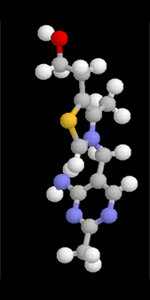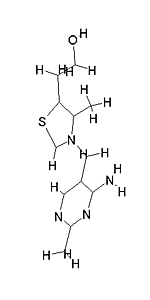 |
 |
Plays a key role in converting carbohydrates into energy. It is required for the production of hydrochloric acid, for forming blood cells, and for maintaining healthy circulation.
Just like all B-vitamins, B-1 is a water soluble and cannot be stored in the body. It must but must be replenished on a daily basis. B-1 is also works best when taken in a balanced complex of the other B vitamins.
Read more about: Why Are English Sailors Called Limeys?
Bibliographic details:
- Article: Vitamin B1 - Thiamine
- Author(s): Dr. Biology
- Publisher: Arizona State University School of Life Sciences Ask A Biologist
- Site name: ASU - Ask A Biologist
- Date published: 11 Jan, 2010
- Date accessed:
- Link: https://askabiologist.asu.edu/vitamin-b1-thiamine
APA Style
Dr. Biology. (Mon, 01/11/2010 - 09:55). Vitamin B1 - Thiamine. ASU - Ask A Biologist. Retrieved from https://askabiologist.asu.edu/vitamin-b1-thiamine
Chicago Manual of Style
Dr. Biology. "Vitamin B1 - Thiamine". ASU - Ask A Biologist. 11 Jan 2010. https://askabiologist.asu.edu/vitamin-b1-thiamine
Dr. Biology. "Vitamin B1 - Thiamine". ASU - Ask A Biologist. 11 Jan 2010. ASU - Ask A Biologist, Web. https://askabiologist.asu.edu/vitamin-b1-thiamine
MLA 2017 Style
Be Part of
Ask A Biologist
By volunteering, or simply sending us feedback on the site. Scientists, teachers, writers, illustrators, and translators are all important to the program. If you are interested in helping with the website we have a Volunteers page to get the process started.


